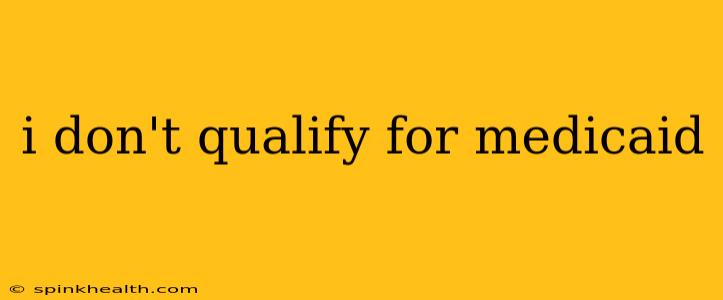I Don't Qualify for Medicaid: What Now? Navigating the Healthcare Maze
The sinking feeling when you discover you don't qualify for Medicaid is understandable. Healthcare costs in the United States can be daunting, and the lack of Medicaid coverage can leave many feeling lost and overwhelmed. But don't despair! This isn't the end of the road. There are options, and understanding them is the first step towards finding affordable healthcare. Let's explore your possibilities.
My own journey with healthcare access wasn't always smooth. I remember the stress of facing unexpected medical bills, the worry about how to afford necessary care, and the sheer frustration of navigating the complex system. This experience fueled my desire to help others understand their options and advocate for themselves.
What are the common reasons for Medicaid disqualification?
This is often the first question people ask after receiving a denial. Medicaid eligibility requirements vary by state, but generally revolve around income, assets, and residency. You might have been disqualified because your income exceeded the limit, your assets were too high, or you didn't meet the residency requirements of your state. Sometimes, even seemingly minor details, like failing to provide all necessary documentation, can lead to a denial.
What are my options if I don't qualify for Medicaid?
This is where things start to look brighter. Just because you don't qualify for Medicaid doesn't mean you're left without assistance. Let's explore some alternatives:
-
The Affordable Care Act (ACA) Marketplace: This is a great place to start. The ACA offers subsidized health insurance plans to individuals and families who earn too much to qualify for Medicaid but still need financial assistance. The amount of subsidy you receive will depend on your income and location. Navigating the marketplace can seem complicated, but many resources are available to help you understand your options and find a plan that fits your budget.
-
Employer-Sponsored Insurance: If you're employed, check if your employer offers health insurance. This is often a cost-effective way to access healthcare, and the cost is typically split between you and your employer.
-
Children's Health Insurance Program (CHIP): If you have children, CHIP may be an option. This program provides low-cost health coverage to children in families who earn too much to qualify for Medicaid.
-
Charitable Clinics and Hospitals: Many communities have charitable clinics and hospitals that offer reduced-cost or free healthcare services to low-income individuals. These organizations often rely on donations and volunteers to provide care to those in need.
Can I appeal my Medicaid denial?
Absolutely! Denials are not always final. You have the right to appeal the decision. The appeal process varies by state, but usually involves submitting additional documentation or requesting a hearing. Carefully review your denial letter for instructions on how to file an appeal. Don't hesitate to seek assistance from a consumer advocate or legal aid organization if you need help navigating the appeals process.
How can I reduce my healthcare costs?
Even with insurance, healthcare costs can be significant. Here are some strategies to reduce your expenses:
-
Negotiate medical bills: Don't be afraid to negotiate with healthcare providers about the cost of services. Many are willing to work with patients who are facing financial hardship.
-
Shop around for medical services: Compare prices for different providers and services before making a decision.
-
Use generic medications: Generic drugs are usually much cheaper than brand-name drugs and are just as effective.
-
Preventive care: Regular checkups and preventive care can help you avoid costly medical emergencies down the road.
Finding affordable healthcare can feel like a marathon, not a sprint. Remember that you're not alone in this process. There are resources available, and with perseverance and the right information, you can access the care you need. Don't be afraid to seek help from consumer advocates, healthcare navigators, and local community organizations. They are there to support you on your journey.

